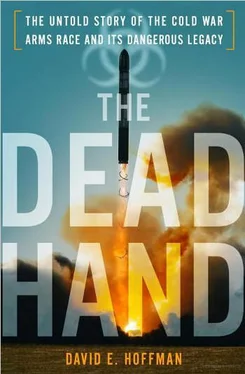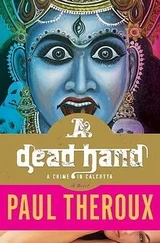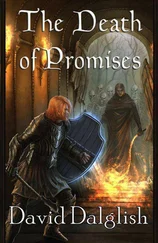On the evening of Sunday, March 10, Gorbachev returned home from work and took a call from the Kremlin doctor, Yevgeny Chazov. Chernenko had died of heart failure and complications from emphysema at 7:20 P.M. Gorbachev, who had been passed over in the transition after Andropov, wasted little time. A Politburo meeting was called at the Kremlin for 11 P.M. Three voting members, including two old Brezhnevites, were out of the country and would not make it back.
About twenty minutes before the meeting started, Gorbachev met Gromyko, the foreign minister, lion of the old guard, in the Walnut Room, where full voting members of the Politburo often gathered before formal sessions. Gromyko was the key figure in deciding who would be the next general secretary. Earlier, Gromyko had sent a private emissary to Gorbachev with the message that he would back him in the succession struggle, in exchange for being allowed to retire as foreign minister and take up a sinecure position as chairman of the Supreme Soviet. The back channel was through Gromyko’s son, Anatoly, and Gorbachev’s reformist adviser, Yakovlev. 39
When Gorbachev and Gromyko met in the Walnut Room, they reconfirmed the understanding reached earlier.
“Andrei Andreyevich, we have to consolidate our effort, the moment is crucial,” Gorbachev recalled saying to Gromyko.
“I believe everything is clear,” Gromyko replied.
When they had all assembled, Gorbachev informed the Politburo of Chernenko’s death. Usually, the person chosen to head up the funeral commission was the one who would be the next general secretary. The question of the funeral commission arose. There was momentary hesitation in the room: Would Grishin make a play for it?
In fact, before the meeting, Gorbachev had already made a gesture to Grishin, who declined to head the commission.
“Why the hesitation about the chairman?” Grishin said now, in front of the Politburo members. “Everything is clear. Let’s appoint Mikhail Sergeyevich.”
The old guard had died. Gorbachev became head of the commission and the next day would become the new general secretary. Precisely why Grishin did not fight is not known, but he may well have realized, or sensed, that he had no chance, that Gromyko would support Gorbachev.
Gorbachev was a shining light in a dusky hall. Five of the ten voting members of the Politburo that day were over seventy, three in their sixties and only two in their fifties. Not only was Gorbachev, at fifty-four, the youngest member of the Politburo by a full five years, he was thirteen years younger than the average age of the voting membership. 40Plans were hurriedly made through the night for the transition, which would include a Politburo meeting and then a Central Committee plenum March 11 to ratify the choice.
Gorbachev went home at 4 A.M. He was then living at a large dacha outside of Moscow. Raisa was waiting up. Suspicious of KGB listening bugs, they went out in the garden, as they did almost every day. They strolled the paths for a long time just before dawn. Spring had not yet come, there was snow on the ground. Raisa recalled the air felt very heavy. They talked about the events and the implications. Gorbachev told her he had been frustrated all the years in Moscow, having not accomplished as much as he wanted, always hitting a wall. To really get things done, he would have to accept the job.
“We can’t go on living like this,” he said.
At the next day’s session, Gromyko delivered a strong testament to Gorbachev, speaking in a way that was not customary on such occasions, without notes and without hesitation. “I shall be straight,” Gromyko began. Gorbachev is the “absolutely right choice.” Gorbachev had “indomitable creative energy, striving to do more and do it better.” Gorbachev respected “the interests of the party, the interests of the society, the interests of the people” above his own, he said. Gorbachev would bring experience of work in the regions and the center, and ran the Politburo while Chernenko was ill. This required knowledge and stamina. “We won’t make a mistake if we choose him,” Gromyko said.
After the agonizing years of stagnation, death and disappointment, Gorbachev was chosen first and foremost as the best hope to get the country moving. 41Georgi Shakhnazarov, who had served Andropov and would later advise Gorbachev, recalled that Gorbachev’s rise was not a certainty. Gorbachev did not have a sterling biography that made him the natural choice, and the Politburo might have chosen another, such as Grishin, to muddle through. But Shakhnazarov felt there was one factor that, while not official, could not be ignored. “People were desperately tired of participating in a disgraceful farce… They were tired of seeing leaders with shaking heads and faded eyes, knowing the fate of the country and half the world was entrusted to the care of these miserable semiparalytics.” 42
————— 9 —————
YEAR OF THE SPY
When Reagan was awakened March 11, 1985, at 4 A.M., with word that Chernenko had died, he asked Nancy, “How am I supposed to get anyplace with the Russians if they keep dying on me?” Four leaders—Lenin, Stalin, Khrushchev and Brezhnev—had guided the Soviet Union over its first six decades. Now it had the third new leader in three years. Perhaps no one really knew at this early point that Gorbachev would become a revolutionary. But at first, Reagan missed the signs. He was blinkered by his own deep anti-communism and his own long-held ideas about the Soviet system, and hampered by lack of good intelligence. To the United States, the Kremlin remained a black box. Reagan and many of those around him could not imagine a Soviet leader carrying out radical reform from above. Shultz saw promise in Gorbachev, as had Thatcher in Britain, but Reagan’s circle was riven by disagreement, and there was no consensus that this was a man they could do business with.
Among the hard-liners, Robert Gates, then the deputy CIA director for intelligence, felt that Gorbachev was a tough guy wearing a well-tailored suit. Underneath, he saw trouble, and did not want to be fooled. In the weeks before Gorbachev took power, in February 1985, Gates wrote a memo to one of the CIA’s leading Soviet experts. “I don’t much care for the way we are writing about Gorbachev,” Gates said. “We are losing the thread of what toughness and skill brought him to where he is. This is not some Gary Hart or even Lee Iacocca. We have to give the policy-makers a clearer view of the kind of person they may be facing.” Gates said he felt that Gorbachev was the heir to Andropov, the former KGB chief, and to Suslov, the onetime orthodox ideology chief. Thus, Gates said, Gorbachev “could not be all sweetness and light. These had been two of the hardest cases in recent Soviet history. They would not take a wimp under their wing.” 1
Reagan found this analysis very appealing. The assumption was based on years of imagining a Soviet monolith—that all leaders were alike, that the system could not change. Reagan met with U.S. Ambassador to Moscow Arthur Hartman. “He confirms what I believe that Gorbachev will be tough as any of their leaders,” Reagan recalled. “If he wasn’t a confirmed ideologue he never would have been chosen… by the Politburo.” 2
Yet Reagan was capable of holding multiple views at the same time. He still dreamed of eliminating nuclear weapons, even if he had doubts about the new Soviet leader. He mentioned elimination of nuclear weapons as “our common goal” in one of his first letters to Gorbachev. 3Reagan also listened to Shultz, who urged him to use “quiet diplomacy” with the new Soviet leader. As Reagan recalled it, this meant “the need to lean on the Soviets but to do so one on one—not in the papers.” 4
Читать дальше












